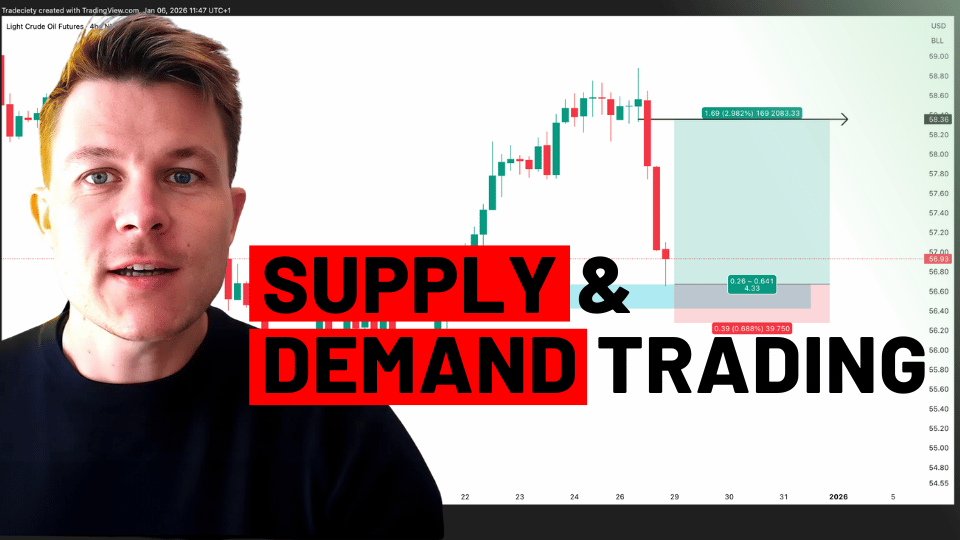Supply and Demand Trading in 2026
We have been trading supply and demand strategies for over ten years, and they have stood the test of time remarkably well. Supply and demand is...

“Our potential is one thing. What we do with it is quite another.”
– Angela Duckworth
Like many traders, Chelsea and Emmett took different paths toward building their careers on the stock market.[1]Chelsea came from a wealthy family in New York City, where she attended private school and was eventually accepted into an Ivy League university. When she graduated, her parents gave her the money that she needed to start trading, and after a few months, she had earned more than $50,000.
Emmett grew up in a blue-collar family in Pittsburgh, where he had to take care of his brothers and sisters while his parents worked double shifts. When he got his high school diploma, he enrolled in an economics program at a local college and paid his way through school. By the time he graduated, he had enough money to start trading and work his way out of poverty.
But in 1987, Chelsea and Emmett had one of the worst trading days in the history of the stock market. After losing all of her money on Black Monday, Chelsea decided to pursue a different career. Emmett, on the other hand, was willing to learn from his mistakes and bounce back from failure; today, he’s one of the most successful traders in his state.
So why did Emmett succeed when Chelsea had all of the resources that she needed to build a lucrative trading career?
Angela Duckworth, a world-renowned psychology professor from the University of Pennsylvania, would tell you that Emmett’s commitment to building a better life for himself was far more important than Chelsea’s untapped potential. In other words, Emmett had something that every successful trader needs — grit.
Over the course of her career, Duckworth has studied thousands of students, faculty, and staff in high-stress occupations to identify the traits that led to their long-term success. In her NYT bestselling book Grit: The Power of Passion and Perseverance, Duckworth explains that intelligence, money, and favorable circumstances can only get us so far. The most important quality that we can develop is grit, or a powerful combination of “perseverance and passion for long-term goals”.[2]
Her research has transformed the way that organizations find, recruit, and train employees in the 21st Century, but it also has huge implications for traders. In an industry where 80 percent of day traders quit within the first two years, grit can change the way that we approach our trades, build our careers, and recover from losses.[3]
If you want to become a “grittier” trader, you need to develop a unique set of skills, traits, and habits that will drive your success on the stock market. Here are three ways that you can develop passion and perseverance as a trader, based on Duckworth’s internationally-acclaimed research:
#1 Create Your Own Standard For Grit
There are so many things that can motivate you as you trade throughout the day: the opportunity to gain financial independence, the ability to support your family, or the thrill of succeeding at a challenging career. Duckworth explains that these internal and external sources of motivation are deeply connected to your passion — or sense of purpose — for your job.
One of the easiest things that you can do to become a “grittier” trader is to clearly define those motivating factors. Take a few minutes to reflect and write them down on a piece of paper. When you’re done, put them up on the wall in your office; if you have time, feel free to add pictures of the people, places, and things that you described in each statement. Whenever you struggle with a trade, a bad day on the stock market, or a series of losses that you just can’t shake, you can look up and reclaim your sense of purpose without stepping away from your computer.
#2 Develop A Growth Mindset
In her book, Duckworth explains that people who have a growth mindset (those who view challenges as opportunities instead of obstacles) are far more likely to persevere in difficult situations. There are a few things that you can do to develop a growth mindset in your trading career:
#3 Build A Network Of Supporters
In addition to changing the way that you think about your career, you should also make changes to the people that you surround yourself with. Build a network of supporters in your personal and professional life; as you navigate the highs and lows of the stock market, they will encourage and motivate you to pursue long-term success.
First of all, having an accountability partner can make a huge difference. With your accountability partner, you share your progress, your setbacks, worries and ideas. The accountability partner does not even have to be a trader. All you need is someone you can trust and that is willing to listen. Trading can be lonely at times and an accountability partner will often help you take the next step.
In addition to her bestselling book, Angela Duckworth has created an online survey that will tell you how “gritty” you are — click here. to find out!
[1]This is an illustration with two fictitious characters
[2]Duckworth, A. L. (2013). Grit: The power of passion and perseverance. Retrieved from https://www.ted.com/talks/angela_lee_duckworth_grit_the_power_of_passion_and_perseverance?language=en#t-393790
[3]Barber, B. M., Lee, Y., Liu, Y., & Odean, T. (2014). Do Day Traders Rationally Learn About Their Ability? SSRN Electronic Journal. doi:10.2139/ssrn.2535636

We have been trading supply and demand strategies for over ten years, and they have stood the test of time remarkably well. Supply and demand is...

3 min read
Choosing the right trading journal is essential for traders wanting to analyze performance, refine strategies, and improve consistency. In this...

3 min read
“95% of all traders fail” is the most commonly used trading related statistic around the internet. But no research paper exists that proves this...